All over the world we have people thriving on tea and coffee. Some people even go to the extreme of drinking many cups of these beverages in a day. There are varieties of teas like milk tea, black tea, green tea etc, drinking of which has been picking up increasingly as a trend. Since people consider tea/coffee as an essential part of their daily diet, it is essential to know the ill side effects of coffee and tea on us. Let us find out more from this article.
1. Consumption of drinks like tea, coffee
We drink tea and coffee or soft drinks according to our likes and dislikes. The ill side effects of coffee and tea are given ahead.
A. Harmful side effects of coffee and tea
There are ten types of poison in tea and coffee.
- There are 18% tannins, poisonous chemicals, in these drinks. These may increase risk of esophageal cancer. These create a fissure in the stomach and generate gas in it.
- There is 3% theanine (a poisonous substance) in these drinks. It causes mental imbalance and also heaviness in the lungs and head.
- There is 2.75% poison named caffeine in it. This weakens the kidneys.
- A poison known as ‘volatile’ is harmful for the intestines.
- Carbonic acid increases acidity in the body.
- Pomin weakens the digestive ability.
- Aeromolic has an ill-effect on the intestines.
- Cyanogen causes dreadful ailments like insomnia and paralytic strokes.
- Oxalic acid is very harmful for the body.
- Stenoil causes blood diseases and impotency.
- Hence, an individual should never drink tea or coffee.
B. Attempts by demoniacal energies to enhance Raja-Tama components through the medium of tea!
Sattvik (Sattva-predominant) food is tasty; even its small morsel has a satisfying effect. On the other hand, rajasik (Raja-predominant) and tamasik (Tama-predominant) foods awaken desires and there seems to be some mystery shrouding this as they keep recurring again and again : Tea is liked by all. Some people are not comfortable unless they have their cup of tea. They can remain without food but not without tea. Some need to have their tea at a specific time. If they do not get it, they become uneasy and only resume their work after having their tea. They are then able to comprehend. They want tea even if they have experienced the ill-effects of tea. Drinking tea becomes an addiction and it is difficult to abstain from it. It is an extraordinary aspect to get so addicted to tea. Besides, tea has no special taste as such. Even a very tasty item can be eaten to a certain limit. We are satisfied by it. This is because Hindu art of recipes is complete in itself. Our sattvik dishes are tasty and even their small morsel has a satisfying effect. No recurrent thoughts about it come to our mind. On the other hand, rajasik and tamasik items awaken desires and we keep thinking about them again and again. This is a mystery; but superficially our intellect cannot comprehend this.
The taste for tea is created by impressing it on the minds of people, thus generating addiction and thereby creating a ‘tea-culture’ ! : Tea does not belong to Bharat. The seed of this drink was sown by the British who landed here with a store of black energy. They not only imported tea to Bharat, but also spread its use by keeping us in the dark. Although tea is not a decent drink, when compared with other better drinks, the taste for tea was created by impressing it on the minds of people here. Later, we became addicted to it and thus a ‘tea-culture’ was created.
2. Subtle-effects on an individual upon drinking tea, coffee and milk
A. Coffee
- Neither worship nor religious rituals are performed in western countries. As a result, the predominance of Raja-Tama components in the environment is greater. Since coffee production (seeds) is more in such countries, the Raja-Tama-oriented vibrations, meaning, distressing energies from such environment get attracted to these seeds.
- Effects on the individual drinking coffee : Hyper activeness and creation of deceptive coolness in the body. At psychological level, since coffee contains illusion creating energy, the individual is attracted towards it and craves to drink it repeatedly.
B. Tea
- A tea plant contains Shakti (Divine Energy) and to a certain extent negative energy.
- While the tea leaves are being dried, the Shakti in the fresh leaves gets destroyed, leading to destruction of the sattvikta (Purity) present in them. Consequently, the black energy in the environment gets attracted to these leaves.
- When milk is added to a pot of black tea, the milk too loses its sattvikta.
- Effects on the individual drinking tea : It has Adverse effect on the digestive system and the individual becomes hyperactive by feeling deceptive enthusiasm. The individual remains under 50% mental stress.
C. Milk
- A cow of Bharatiya breed has 33 crore Deity Principles. Such a cow is most sattvik and has ability to attract positive energy. Therefore, its milk is more sattvik. In the western countries, people do not have respect for the Jersey cow nor do they worship it. Hence, the milk of cows there is not sattvik.
- In some cows, Raja-Tama-oriented vibrations in the environment do get attracted. Hence, the milk of such cows is not sattvik; however, when milk is boiled on fire, it imbibes Agnidevata (Deity of Fire)-tattva (Principle), and as a result, it acquires 1% sattvikta.
- Milk is beneficial at all three levels namely physical, psychological and spiritual.
- Effects on the individual drinking milk : Since milk is easy to digest, digestive power is maintained and stability of the body is maintained. Mind of the individual remains calm.
Reference: Sanatan’s Holy Text “Dietary norms and deficiencies in modern diet”

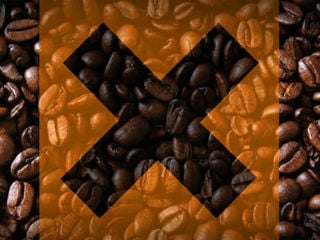
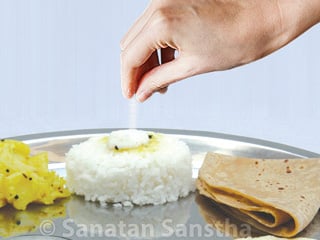 Why use of salt should be restricted ?
Why use of salt should be restricted ?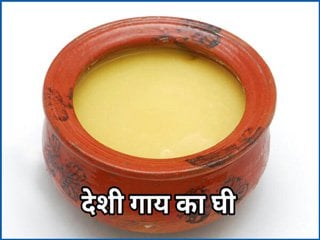 Cow’s milk and the ghee made from Cow's milk
Cow’s milk and the ghee made from Cow's milk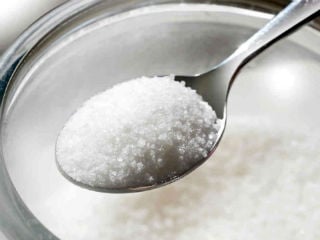 Ill effects of Sugar upon its excessive consumption
Ill effects of Sugar upon its excessive consumption Ill effects of Junk Food, Fast Food and Chocolate
Ill effects of Junk Food, Fast Food and Chocolate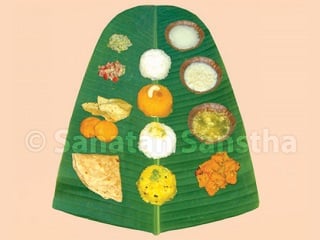 Why the Hindu food preparation (Bharatiya) methods are sattvik?
Why the Hindu food preparation (Bharatiya) methods are sattvik? Pesticides in food, its ill-effects and remedies
Pesticides in food, its ill-effects and remedies